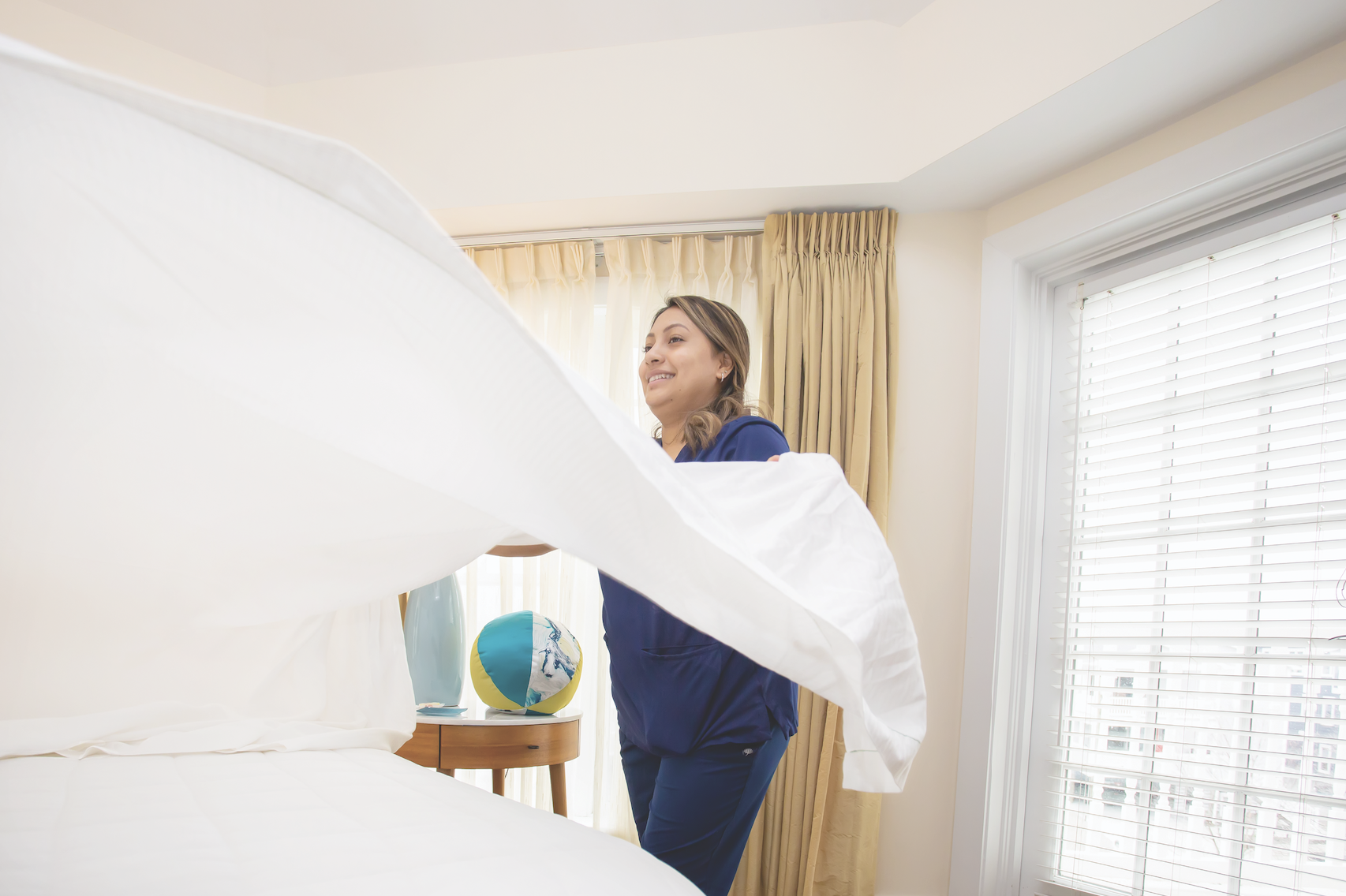
Running a coastal housekeeping operation is often quite a chore
By Pam George.
Photographs by Carolyn Watson.
From the May 2023 issue

Prior to the pandemic, coastal housekeeping companies were cleaning up. Jennifer and Jimi Kellogg, who founded Dust n Time in 2009, had five vans on the road, each ferrying up to five cleaners between jobs.
Biamby Cleaning Services’ revenue soared from $7,000 in 2009 to six figures by early 2020. And Ecolistic Cleaning, which uses earth-friendly ingredients, had expanded from Annapolis to Baltimore to Sussex County, where founder Courtney Sunborn now lives. Then came COVID-19. In early spring 2020, Gov. John Carney banned commercial lodging and short-term rentals to all but essential workers. Many residential clients did not want people in their homes — and many cleaners didn’t want to enter them.
While news headlines focused on the ailing hospitality industry, housekeeping companies quietly suffered. “We lost six figures’ worth of income,” says Jeannie Biamby.
The situation has improved, but the coastal industry is still adjusting to a new normal, with rising wages needed to attract and retain staff while supply costs soar.
The long and short of it
Along the coast, there are multiple housekeeping sectors. For instance, hotels, inns and health care facilities typically hire full-time staff and seasonal employees.
Rental agencies or individual property owners book contractors to clean between short-term rental bookings. Known as a “changeover” or “turnover” cleaning, the work generally occurs in the five hours between check-out and check-in on Saturdays or Sundays. In addition, there is household cleaning for full- and part-time residents and commercial cleaning for businesses.
Regardless of the sector, it is labor-intensive work. Job postings note that applicants must be able to lift and move 25 pounds and stand for up to eight hours a day. The ads should also mention fortitude — cleaners never know what they might encounter, particularly in short-term rentals.
“You find some really bad things in these houses,” says Biamby, who removed a crack pipe from a rental’s bedroom drawer. Her crew once entered a house to discover that someone had attempted suicide. “There was blood everywhere,” said Biamby, who told the client to call a specialty remediation company.
Luke Thompson, owner of Clean Living in the Rehoboth area, says he could write a book about his experiences. When he first started out in the business, he cleaned up almost every type of body fluid. Now he walks away from properties in poor shape. “I have standards.”
Thompson has witnessed a correlation between the lower end of the rental pool and the degree of damage. Age is another factor. Last summer, one family waited hours past check-in so housekeepers could clean up a mess left by young adults. Dust n Time stopped cleaning properties in Dewey Beach, which is still considered party central for college kids. “Never again,” Kellogg vows.
Nevertheless, the profession offers opportunities. Experience and willingness to work hard count more than an academic degree. And the hours can be flexible. Biamby, for instance, was a young mother when she started her business. Doing weekend changeovers meant she could watch the kids during the week. Sunborn began Ecolistic Cleaning as a side hustle to her in-home day care business, and it took off.
The tide turns
Before the pandemic, Sunborn’s business was 80 percent residential, 15 percent rental turnover and 5 percent commercial. The turnover segment now accounts for just 5 percent, mainly because of weekend congestion on Route 1. “It wasn’t worth it financially, and our crews were spending so much time sitting in traffic,” says Sunborn, who founded the company in 2003.
Dust n Time also shifted focus. On Saturdays, the company once had rental cars and vans lined up in a Kmart parking lot to take crews to 65 changeovers. But as the population soared in Sussex County, Kellogg focused on year-round clients, keeping only high-end rentals.
Biamby Cleaning Services and Clean Living continued to bank on short-term rentals. But in spring 2020, all cleaning contractors watched their business plummet.
Due to the ban on short-term rentals, Biamby opened Biamby Sweet Treats in her home to earn extra income. Residential clients began “canceling left and right — they were scared,” recalls Kellogg. Clean Living’s business dropped 80 percent, Thompson says.
Employees were also nervous. Nearly half of Dust n Time’s 36 full- and part-time employees quit, and since many benefited from the federal CARES Act’s $300 weekly addition to unemployment benefits, they were in no hurry to return.
When the dust settled
After the economy opened back up, many clients wanted to resume services. (Some of Kellogg’s clients had continued to pay a regular fee to hold their spot during quarantine.) But there weren’t enough workers.
“I call it the employee pandemic,” Thompson says. “In my opinion, that was worse than COVID — not finding good help.” Biamby can relate. “I would hire 15 to 20 people every week who would accept the job, and I would be lucky if one would show up for work,” she says. “It was horrible. I had to turn down many jobs because I couldn’t get enough help. It’s still an ongoing issue.”
Efforts to motivate the staff made Thompson feel like the employees were the boss — not the other way around. “I’m begging them to do their job. I had to take abuse,” he says. In 2022, he closed the company to attend an evangelism boot camp and travel to Africa. When he returned to coastal Delaware, he reopened Clean Living to specialize in high-end residential work in the Lewes and Rehoboth ZIP codes. (He’s also a real estate agent.)
Many of those still seeking employees have increased the pay above minimum wage. This year, Delaware’s minimum went from $10.50 to $11.75 and will increase yearly until hitting $15 in 2025. But that’s still not enough income to pay for housing near the beaches. Many of Kellogg’s employees live an hour’s drive from Rehoboth, and she’s provided transportation to ensure she has enough cleaners. Sunborn’s beach office gets applicants from Milford, Lincoln and Georgetown.
When gasoline went sky high, some companies provided a gas allowance to workers outside the beach area. But fuel isn’t the only essential item that’s jumped in price. A gallon of Windex went from $9.99 to $15.99, and the cost of mops went up $5. “It’s just ridiculous,” says Kellogg, whose company brings supplies to the homes. What’s more, her commercial car insurance increased by $5,000.
Initially, Sunborn made her own non-toxic supplies, and she provided clients with recipe cards to do the same. Now she purchases the products, which are generally more expensive than conventional solvents. No matter. “We have a huge commitment to green products, but attention to detail and reliability are also our specialties,” Sunborn says. Ecolistic’s clients “see the value of what we offer.” As a result, many did not balk when she raised her rates.
Others are not as accommodating. After the pandemic, Dust n Time raised its rates for the first time in 10 years. A client in one community found a cheaper cleaner — no surprise there; it happens. But Kellogg had 10 clients in the same community, and many followed the first homeowner’s lead.
Cheaper is not better. “A lot of new companies start great, but in the heat of summer, as they take on more jobs, they’re not prepared; they haven’t taken the hits that other companies have and end up dropping clients,” Thompson explains.
It’s not easy to show up on time to scrub with a smile after spending a summer day on a packed coastal highway. “That,” he says, “is where integrity comes in. You get what you pay for.”



